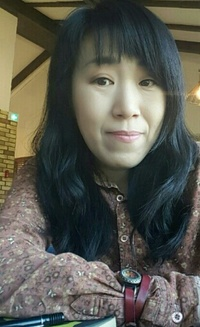박서영/ Kafka’s sleep/ Park Seo Young(카프카의 잠)
페이지 정보
작성자 관리자 작성일18-01-30 21:10 조회5,048회관련링크
본문
카프카의 잠
박서영
비둘기는 환풍구 배관에서 겨울을 나고 날아가 버렸다
이젠 덕지덕지 똥만 가득 쌓여 있다
화석처럼 굳어버린 잠의 배설물들
서울 가서 본 적 있다
점심시간 손님들이 북적대는 칼국숫집 출입문 앞에
환기구 하나 얻지 못한 사내가 잠들어 있었다
손님 중에는 잠든 사내의 늘어진 다리를 슬쩍 뛰어넘어
식당으로 들어간 이도 있었다
너무 오랫동안 그 자리에 있어서인지
손님들도 식당 주인도 사내를 잠의 배설물쯤으로 여기는 듯 했다
하루 만에 우리는 모녀 노숙자처럼 황폐해져서
아무 의자에 털썩 주저앉곤 했는데,
기차를 타자마자 곯아떨어져서는 꿈쩍도 하지 않았는데,
누군가 우리를 냄새나는 잠의 배설물로 오해하더라도
침까지 흘리며 쿨쿨쿨 잘 잤다
기차의 아름다운 이미지가 깊은 잠에 들게 했으리라
봄으로부터 출발한 기차의 몸속이 무척 따뜻해서,
집으로 돌아온 나는
낯설고 기이한 몇 가지 풍경을 기억해 냈다
그 칼국숫집 앞에서 만난 거대한 애벌레와
노숙자들이 하루 종일 만나는 예수와
애 밴 여자 노숙자의 불룩한 배,
잠 속에서 당신이 나를 툭 치고 지나갔다
Kafka’s sleep
Park Seo Young
The pigeon spent the winter in a ventilation pipe, then flew away.
Now its droppings alone remain in piles,
sleep’s excrement, hard as a fossil.
Something seen on a visit to Seoul—
in front of the entrance to a crowded noodle place, at lunchtime,
a man without a ventilation pipe was sleeping.
Customers entered the restaurant
by jumping lightly over the sleeping man’s legs.
Perhaps because he had been there for so long,
the customers and the owner had come to think of him as sleep’s excrement.
In just a day, we became broken down, a homeless mother and daughter,
and collapsed in any seat on the train;
immediately we fell asleep and didn’t stir.
Even if the others considered us sleep’s stinking excrement,
we slept well and drooled.
Maybe the beautiful image of a train led us into a deep sleep,
and the inside of the train’s body was so warm, having set out in spring.
After returning home,
I recalled strange images.
The giant caterpillar asleep in front of the noodle place,
and Jesus, met by homeless people all day,
and the belly of the pregnant homeless woman.
In my sleep, you tapped me lightly as you passed.
* Translations by Chung Eun-Gwi and Brother Anthony of Taizé
Eun-Gwi CHUNG is Professor in the Department of English Literature and Culture at Hankuk University of Foreign Studies, Seoul, Korea. She has translated lots of contemporary Korean poetry into English including Fifteen Seconds without Sorrow by SHIM Bo-seon (Parlor Press, 2016) and The Colors of Dawn: Twentieth-Century Korean Poetry (Hawaii University Manoa Press, 2016), and Ah, Mouthless Things by LEE Seong-bok(Green Integer, 2017).
Brother Anthony of Taizé was born in England in 1942. After studying in Oxford he joined the Community of Taizé in France. He has been living in Korea since 1980, teaching English literature at Sogang University, where he is now an emeritus professor. He is also a chair-professor at Dankook University. He has served as President of the Royal Asiatic Society Korea Branch since 2011. In 1994 he became a Korean citizen with the Korean name An Sonjae. He has translated works by many major Korean writers, mostly poetry, publishing over 40 volumes by such writers as Ko Un, Lee Si-Young, Jeong Ho-Seung, Do Jong-Hwan, Kim Seung-Hee etc. and so helped make Korean literature better known worldwide.
번역: 정은귀
한국외국어대학교 영미문학문화학과 교수. 뉴욕주립대 영문학 박사. 심보선 시인의 시집 <슬픔이 없는 십오 초>, 이성복 시인의 시집 <아 입이 없는 것들>, 그리고 동시대 한국시인 44명의 시를 묶은 <새벽의 빛: 20세기 한국시>를 비롯하여 한국시의 영역에 힘쓰고 있고 영미시와 한국시에 대한 글 다수 발표.
번역 : 안선재
안선재 (Brother Anthony of Taizé): 1942년 영국에서 태어났으며, 옥스포드 대학교에서 공부를 마치고 프랑스 떼재공동체의 일원으로 수사 생활하였습니다. 1980년부터 한국에서 거주했으며, 현재 명예교수로 있는 서강대학교에서 영문학을 강의하였습니다. 또한 그는 단국대학교 석좌교수, 한국 왕립아세아학회 회장을 역임하였고, 1994년 ‘안선재’라는 이름으로 한국인으로 귀화했습니다. 주요 한국 문학 작품들을 영어로 번역했으며 특히 고은, 이시영, 정호승, 도종환, 김승희 등 저명한 한국 작가들의 시와 소설를 한 45권 영어로 번역출판하여 한국 문학을 세계에 알리는 일을 해왔습니다.

박서영
1968년 경남고성 출생. 95년 『현대시학』으로 등단했다. 시집으로 『붉은 태양이 거미를 문다』와 『좋은 구름』있다. 제3회 고양행주문학상을 수상했다.


